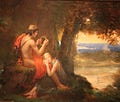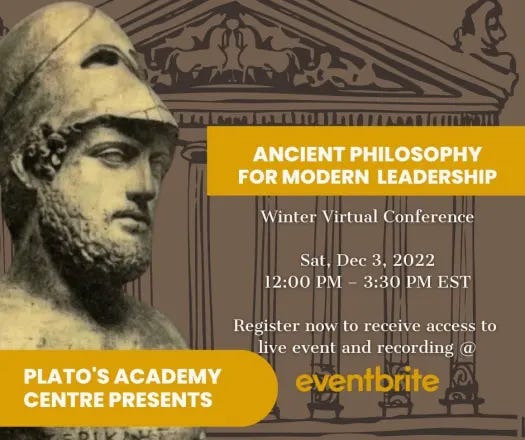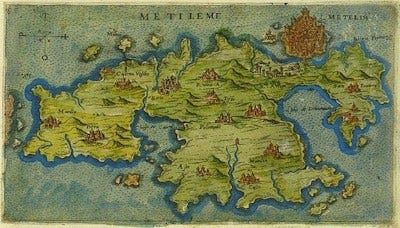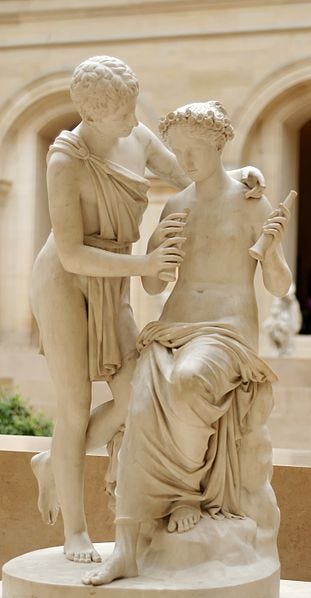Dear Classical Wisdom Reader,
“Too many books. Not enough time”.
Thus read the inscription on my beloved grandmother's favorite sweater. She was a librarian her entire life…She even set one up in her retirement home before she gave up the ghost.
So perhaps it’s no surprise that I love books. I suspect, because you are here reading this, then you do too.
In fact, I know that we have many, many book aficionados among our readers because of the huge outpouring from Monday’s article: A Book a 100 Years in the Making.
I’ve been blown away by how international the responses have been. From the Philippines to France, Colombia to Colorado, Australia to Austria, and everywhere in between...people want to be a part of this project.
I’m truly honored… I love knowing our community covers the globe because (and forgive me for a moment if I sound a little sentimental) it reminds me that our mission, to promote and preserve the classics, is a truly global endeavor.
This is because we are all part of this ongoing project called civilization… all doing our bit to contribute to humanity and we all know its important.
So, if you didn’t get a chance earlier to learn more about the history of this book, and what it means, you can do so here:
I hope you can take part.
In the meantime, I have a more light hearted article for you to end the week, a charming love story set on the island of Lesbos as well as the very first ancient Greek novel. It’s a beautiful, heart warming tale… but its true topic may surprise you.
Read below to learn how Daphnis and Chloe were so influential and ever lasting.
All the best,
Anya Leonard
Founder and Director
Classical Wisdom
Ancient philosophy for modern leadership:
This Saturday
Classical Wisdom has volunteered a lot of time and resources to the Plato’s Academy Centre…. This is because of our continuing commitment to the preservation of the ancient world.
Plato’s Academy Centre aims to restore the archeological site of Plato’s original school - the first of the ancient world - to its former glory. Not only will this help bring the due respect and acknowledgement to this incredibly important site, it will also help reinvigorate a much needed area in Athens.
If you’d like to learn more about Plato’s Academy Centre’s mission, or enjoy this Saturday’s conference on ancient philosophy for modern leadership, you can register here.
I’ll be speaking on mythology and leadership as well as co-hosting… until Argentina and Australia play in the World Cup, because frankly it will be too noisy.
*please note: all donations go to the restoration of the archeological site.
Daphnis and Chloe: A Lesbian Novel
By Ben Potter
“What her passion was she knew not, for she was but a young girl and bred up among cIowtis, and as for love, had never so much as heard the name of it. But her heart was vexed within her, her eyes, whether she would or no, wandered hither and thither, and her speaking was ever Daphnis this and Daphnis that.” ― Longus, Daphnis and Chloe
Today we will tackle a love story from the languid prose of Longus. It’s the original bucolic tale of star-crossed lovers, Daphnis and Chloe.
But first, let us begin with its author.
Very little is known about Longus, this ‘Greek’ author with a Latin name. While he could easily have been a migrant to the island of Lesbos, it is more commonly accepted that he was a freed slave of a Roman family. This means, however, that he could have originated from anywhere and just happened to have an usually firm grasp of the Greek language.
Regardless, his knowledge and description of the beautiful island of Lesbos (most famous for Sappho and her laissez-faire attitude to sexuality) is such that he must have spent a considerable amount of time there.
Slightly mysteriously, Longus has become something of a forgotten man of the ancient world and far from the household name he should be. Perhaps this is because of his mongrel or slavish status or because Roman eyes in the 2nd century AD looked West and not East. Alternatively, it could have been that that particular hundred years was one of relative literary lull (considering what had preceded it)... or maybe it was just one of those things!
That said, he has not been without influence. His work is well remembered in both art and music by no lesser men than François Boucher and Maurice Ravel respectively. Also, Daphnis and Chloe may have been the inspiration for that swashbuckling Rob Reiner masterpiece, The Princess Bride.
But Longus was important for much more than that...
He actually wrote a clear and unambiguous novel. This praise may sound scant in the extreme (after all, even Dan Brown is a novelist), but the art-form was far from established in the 2nd century AD and had its early practitioners been hackish and insipid, then it may not have lasted the course.
As it was, Longus was not merely an early exponent of the novel, but, as mentioned before, of star-crossed love.
Despite its generally well-deserved reputation for (male) promiscuity, the ancient world did produce examples of couples striving to be together. However, what was lacking in the literature was the presence of the true, requited, all-consuming love which Shakespeare was so very fond of (his debt to Longus is not insignificant).
Longus was, if not quite the founder, then very much instrumental in the development of the romantic novel. Not only this, but his early formula is one that has rarely been significantly tampered with... and that is love by trial.
At every turn, Daphnis and Chloe's love and lives are under threat from romantic rivals, negligent and offhandedly brutal parents, natural dangers, quasi-rapists, social status, sinister sodomites, pirates and slavers. In short, all the good stuff that sets a publisher salivating.
And just how were these many perilous obstacles met, mastered or, indeed, succumbed to? Well, I won't deprive you of the pleasure of discovering that for yourselves. And although pleasure is a perfectly pertinent word, perhaps 'charm' is more le mot juste.
And Daphnis and Chloe positively oozes charm.
The smitten and, often bumbling, protagonists give love a beguiling innocence that does well to glide on a zephyr comfortably above the saccharine. Such is their naïvety, especially considering that they spend most of their days with animals, they are unable to comprehend how to sate their burning desire. In an effusion of community spirit, a local woman of 'knowledge' takes pity on the beautiful young Daphnis and explicitly educates him in the mechanics of lovemaking.
Even more charming still is that, in the 1916 edition of George Thornley's translation, this almost embarrassingly tame passage was thought lubricious enough to need some censoring. It was not omitted altogether, but remained only in Latin – thus ensuring only a gentleman would be able to read it!
Innocent charm extends beyond the sexual and occurs in no small part due to the novel's propagation of the bucolic idyll.
Whilst many, including the Stratford Bard, stand on the shoulders of Longus, the Lesbian himself teeters on the substantial literary frame of no less a man than Virgil. It was the Augustan poet's veneration of all things pastoral that helped give the countryside an aura of peace, tranquillity, purity and goodness, rather than face up to the grinding realities of perpetual toil, drought, flooding, famine and the imminent prospect of death (from marauding Gauls, fierce animals, or capricious rulers).
The language and imagery of Daphnis and Chloe are drenched in rustic romance. It is almost too easy to hear the bleat of the goats and the rustle of the leaves lazily conceding supremacy to the sounds of panpipes and coquettish, teenage giggles. In all but the strictest geographical terms, here we have an unspoilt image of Arcadia.
The strangest thing about the story, a fact we find almost impossible to remember come journey's end, is that this is no tale of simple agrarian folk at all, nor is it about love, or the gods behind such emotions...
...it is about a painting.
Daphnis and Chloe is one of the longest and most sustained examples of 'ekphrasis', or a description of a work of art, there has ever been. In the opening lines a man, presumably Longus, comes across, “a spectacle the most beauteous and pleasing of any that ever yet I cast my eyes upon. It was a painted picture, reporting a history of love”.
The inspiration of this supreme work prompts him to immortalize in print a work of similar beauty... or at least of comparable charm.









